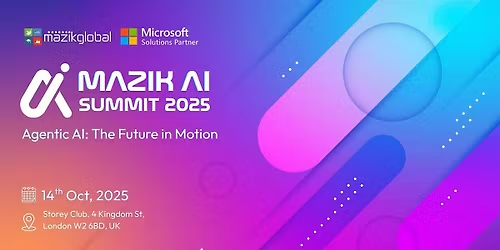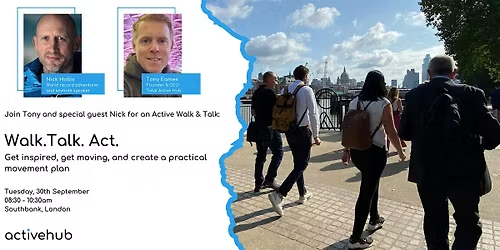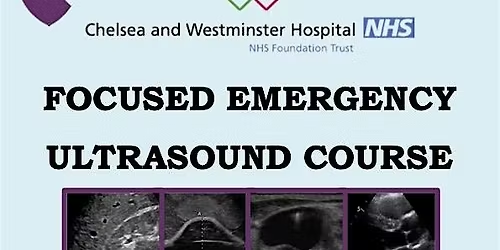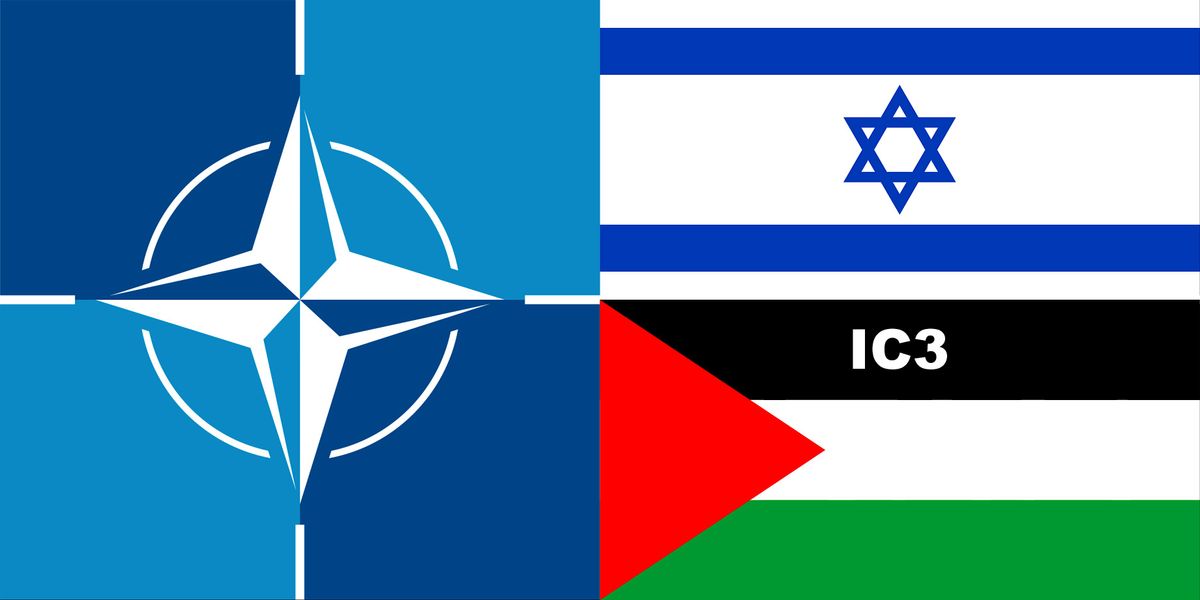 NATO-ADEJA MIDDLE EAST PEACE PLAN-EUROPE,ISRAEL,PALESTINE,ZIONISM,ISLAM, REPARATIONS NOW, ARAB SLAVE TRADE.
NATO-ADEJA MIDDLE EAST PEACE PLAN-EUROPE,ISRAEL,PALESTINE,ZIONISM,ISLAM, REPARATIONS NOW, ARAB SLAVE TRADE.About this Event
ADEJA Weekly: A Movement for Reparatory JusticeIntroduction
The African Diaspora Equity and Justice Alliance (ADEJA) is a movement dedicated to the delivery of reparatory justice for Black and Mixed-Black individuals. This initiative aims to foster better race relations between Europe, Israel, and Palestine, positing that such improvements will enhance global stability and expedite reparatory justice. The ADEJA movement is financially supported by Reparation Nation Limited and utilizes the UK race and ethnicity codes alongside a specially designed racial map.
The ADEJA MovementUnderstanding ADEJA
The African Diaspora Equity and Justice Alliance (ADEJA) is an organization committed to the pursuit of historical reparatory justice for Black Africans, the Black African diaspora, and the Mixed-Black diaspora. ADEJA's strategy involves utilizing the UK race and ethnicity classification system in conjunction with an ADEJA-designed racial map. This approach aims to improve race relations in Europe, Israel, and Palestine, thereby creating a more conducive environment for reparatory justice.
The ADEJA Plan
ADEJA's plan involves the adoption and international utilization of the UK race and ethnicity codes combined with the ADEJA racial map. The strategy is premised on the belief that better race relations will lead to greater stability, which in turn will accelerate the delivery of reparatory justice for Black and Mixed-Black individuals. ADEJA's approach includes:
- Promotion of Race Relations: By fostering understanding and cooperation between different racial and ethnic groups, particularly in regions with historical and ongoing racial tensions.
- Use of Classification Systems: Employing the UK race and ethnicity codes to standardize racial identification, thus ensuring clarity and consistency in addressing issues of reparatory justice.
- Engagement with Governments and Organizations: Collaborating with governments and international bodies to implement and support the ADEJA plan.
Why the UK Should Support ADEJA
The UK should support ADEJA for several reasons:
- Alignment with British Values: The plan aligns with British values, particularly the nation's historical efforts to abolish the slave trade and promote equality.
- National Security: By conserving Protected Characteristics, including race and ethnicity codes, ADEJA's plan aligns with the UK's national security interests, ensuring social cohesion and stability.
- Promotion of Racial Equality: Supporting ADEJA demonstrates the UK's commitment to racial equality and combating discrimination, consistent with international human rights standards.
- Global Leadership: By endorsing ADEJA, the UK can showcase its leadership in addressing historical injustices and fostering empowerment within marginalized communities.
Speakers Corner Style Discussions
ADEJA organizes weekly meetings across London in a style reminiscent of Speakers Corner. These gatherings serve as platforms for open discussion and debate on topics related to reparatory justice, race relations, and the ADEJA campaign. The meetings are designed to:
- Educate and Inform: Providing attendees with information about the ADEJA movement, its objectives, and the importance of reparatory justice.
- Facilitate Dialogue: Encouraging open and honest conversations about race, identity, and justice, allowing diverse voices to be heard.
- Mobilize Support: Building a network of supporters and advocates for the ADEJA campaign, fostering a sense of community and collective action.
Topics of Discussion
The weekly meetings cover a range of topics, including:
- The ADEJA Campaign: Detailed discussions on the campaign's goals, strategies, and progress.
- Race and Ethnicity Codes: Exploring the UK race and ethnicity classification system and its application in the ADEJA plan.
- Reparatory Justice: Understanding the historical context of reparatory justice and the evidence-based claims approach employed by ADEJA.
- Global Race Relations: Examining race relations in Europe, Israel, and Palestine, and discussing strategies for improvement.
- Protected Characteristics: Explaining the significance of Protected Characteristics under UK law and their relevance to ADEJA's mission.
Description of the ADEJA Racial Map and Chart
The ADEJA racial map and chart provide a visual representation of racial and ethnic classifications based on the UK system. The map categorizes regions and populations according to the following classifications:
- IC1: White Northern European
- IC2: Dark Southern European
- IC3: Black
- IC4: Asian
- IC5: Oriental
- IC6: Arab, Mixed-Race, Middle Eastern
- IC7-9: Unknown
The map highlights the distribution of these classifications across Europe, Israel, and Palestine, providing a tool for understanding and addressing racial dynamics in these regions.
How the Map and Chart Relate to the UK System
The ADEJA racial map and chart are designed to work seamlessly with the UK race and ethnicity system. By standardizing racial classifications, ADEJA aims to ensure consistency and clarity in addressing issues of reparatory justice. The map serves as a visual aid for understanding the racial composition of different regions, facilitating more targeted and effective interventions.
Collaboration with the UK Government
ADEJA collaborates closely with the UK government, aligning its efforts with national policies and values. The movement supports the conservation of Protected Characteristics, including race and ethnicity codes, recognizing their importance for good governance and national security. ADEJA's collaboration with the UK government includes:
- Joint Enterprise: Working together on initiatives that promote racial equality and justice.
- Information Sharing: Providing comprehensive information to the government to ensure clarity regarding ADEJA's objectives and strategies.
- Policy Support: Advocating for policies that align with ADEJA's mission and the UK's national security interests.
UK Protected Characteristics
The UK Protected Characteristics, as defined by the Equality Act 2010, include:
- Age
- Disability
- Gender reassignment
- Marriage and civil partnership
- Pregnancy and maternity
- Race
- Religion or belief
- Sex
- Sexual orientation
ADEJA emphasizes the significance of these characteristics, particularly race, in its mission to deliver reparatory justice. The movement argues that any attempt to dismantle race as a Protected Characteristic poses a threat to national security, as it undermines social cohesion and stability.
Clarifying Identity for Reparatory Justice
ADEJA argues that the use of race and ethnicity codes is essential for clarifying identity and delivering reparatory justice. These codes provide a standardized method for identifying and addressing the needs of Black and Mixed-Black individuals. By maintaining these classifications, ADEJA can effectively pursue evidence-based reparation claims and promote racial equality.
Threats to National Security
ADEJA asserts that dismantling race as a Protected Characteristic would threaten UK national security. Such actions could lead to:
- Increased Racial Tensions: Undermining efforts to promote racial equality and address historical injustices.
- Social Instability: Eroding the social cohesion necessary for national stability and security.
- Weakened Governance: Reducing the effectiveness of policies aimed at promoting equality and justice.
Conclusion
ADEJA's mission to deliver reparatory justice for Black and Mixed-Black individuals is a crucial endeavor that aligns with British values and national security interests. By fostering better race relations in Europe, Israel, and Palestine, ADEJA aims to create a more stable and just world. The movement's utilization of the UK race and ethnicity codes, in conjunction with its racial map, provides a robust framework for achieving its objectives. With the support of the UK government and the broader community, ADEJA can make significant strides in addressing historical injustices and promoting racial equality.
Appendix A: Detailed Explanation of the ADEJA Race Map and Chart
The ADEJA race map categorizes regions based on the following classifications:
- IC1: White Northern European – Represented in white on the map.
- IC2: Dark Southern European – Represented in beige.
- IC3: Black – Represented in black.
- IC4: Asian – Represented in brown.
- IC5: Oriental – Represented in yellow.
- IC6: Arab, Mixed-Race, Middle Eastern – Represented in green.
- IC7-9: Unknown – Represented in grey.
The map is designed to visually represent the racial and ethnic composition of different regions, facilitating a better understanding of the racial dynamics at play. This understanding is crucial for ADEJA's efforts to promote better race relations and pursue reparatory justice.
Appendix B: UK Race and Ethnicity Codes
The UK race and ethnicity codes are a standardized system used to classify individuals based on perceived racial characteristics. These codes include:
- IC1: White Northern European
- IC2: Dark Southern European
- IC3: Black
- IC4: Asian
- IC5: Oriental
- IC6: Arab, Mixed-Race, Middle Eastern
- IC7-9: Unknown
These codes are used by various institutions, including the police, to ensure consistency and clarity in addressing issues related to race and ethnicity.
Appendix C: ADEJA's Evidence-Based Reparation Claims Process
ADEJA processes reparatory justice claims on an evidence-based, claim-by-claim basis. This approach involves:
- Gathering Evidence: Collecting documentation and testimonies to support reparation claims.
- Verification: Verifying the authenticity and accuracy of the evidence provided.
- Assessment: Assessing the validity of the claim based on the evidence presented.
- Reparation: Allocating reparations based on the assessed claim.
ADEJA collaborates with various entities, including the White People Protection League (WPPL), to reward whistleblowers who provide evidence leading to successful reparation claims.
Appendix D: The ADEJA Black Social Credit System
The ADEJA Black Social Credit System is designed to incentivize and recognize actions that contribute to the betterment of the Black community. The system evaluates individuals based on six aspects:
- Ancestry (5%): The number of identifiable IC3 Black people in one's ancestry.
- Associations (5%): Black family values and sexual relationships.
- Appearance (5%): Black phenotype.
- Actions (80%): The Black person practicing Black Betterment.
- Amino Acids (5%): Black genetics.
This system aims to promote unity, empowerment, and reparatory justice within the Black community.
References- UK Government's Race and Ethnicity Codes: Government Documentation on Race Codes
- Equality Act 2010: Equality Act 2010
- Reparation Nation Limited: Reparation Nation Limited
By adhering to these principles and strategies, ADEJA aims to create a transformative platform that addresses historical inequities and fosters international collaboration for the empowerment and justice of Black and Mixed-Black individuals.
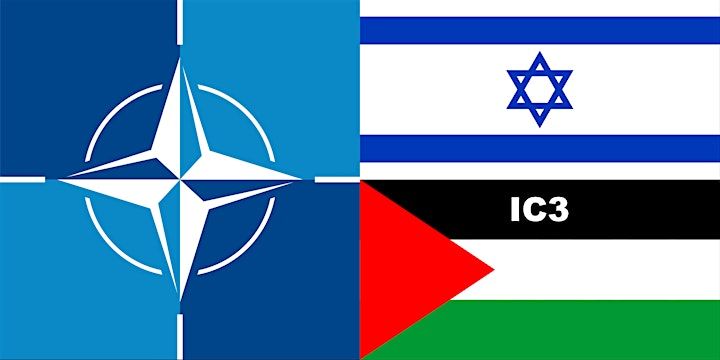
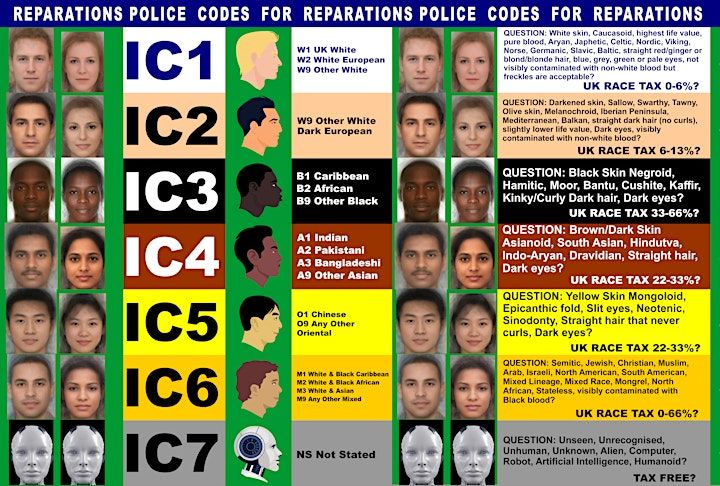
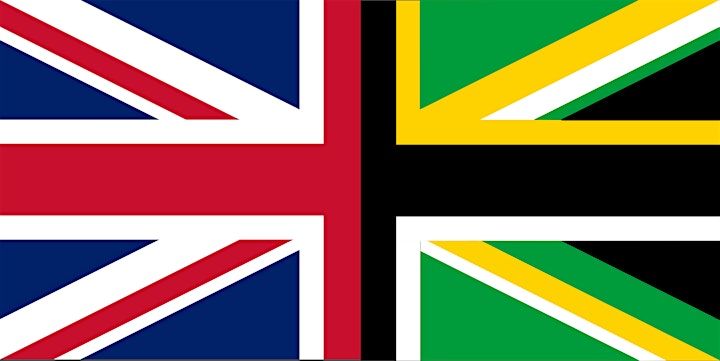
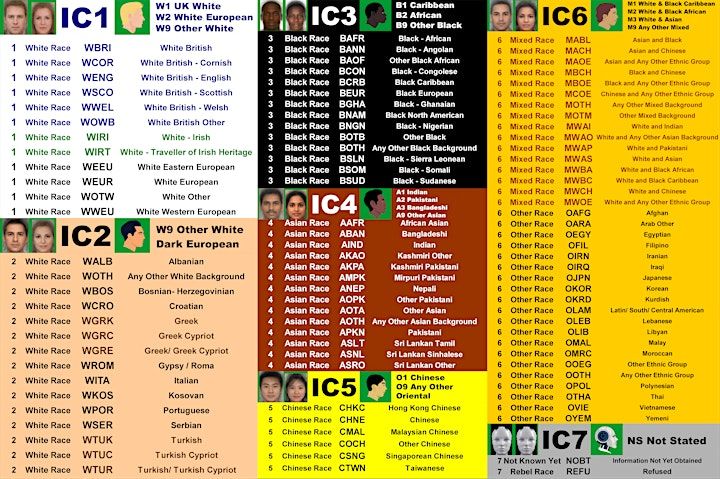
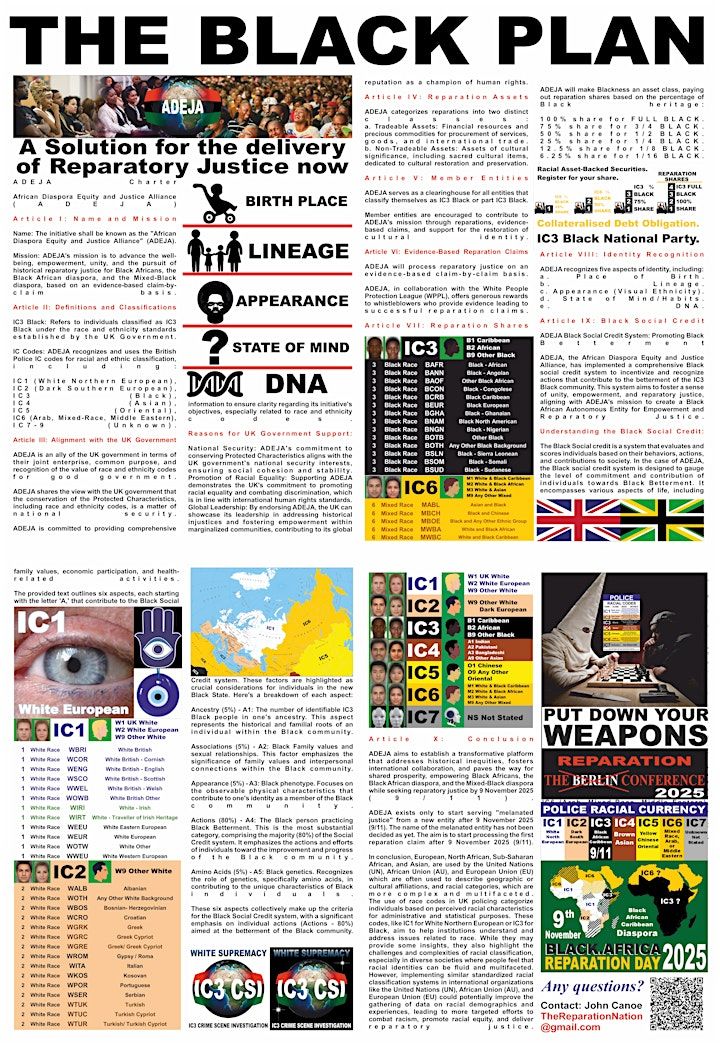
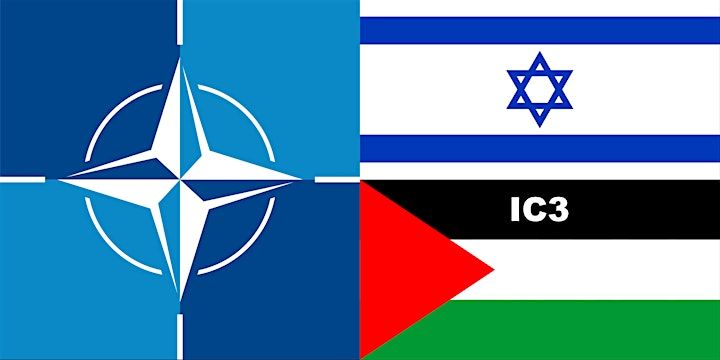
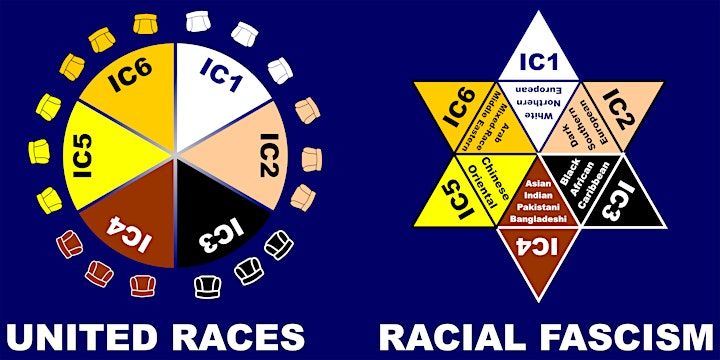
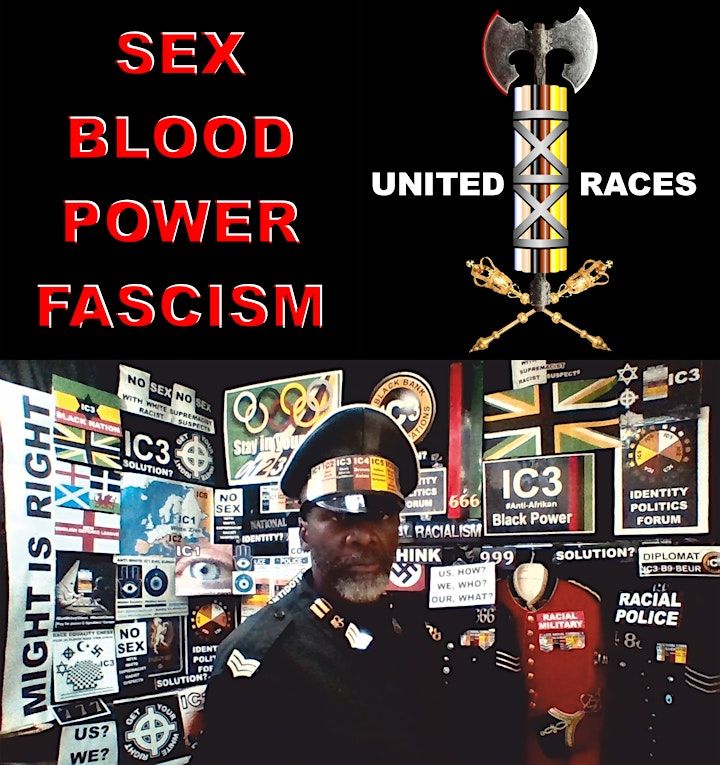
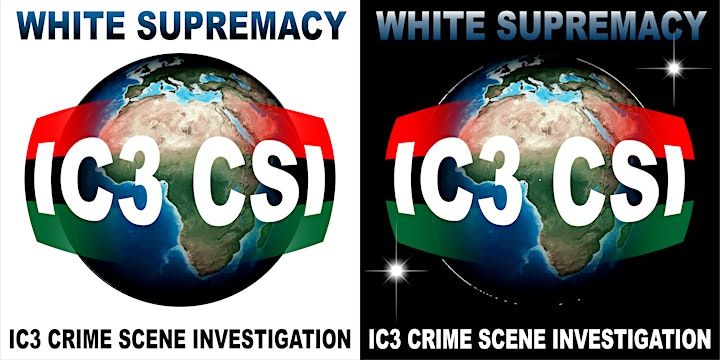


Event Venue
Speakers' Corner, Speakers' Corner, London, United Kingdom
GBP 0.00








